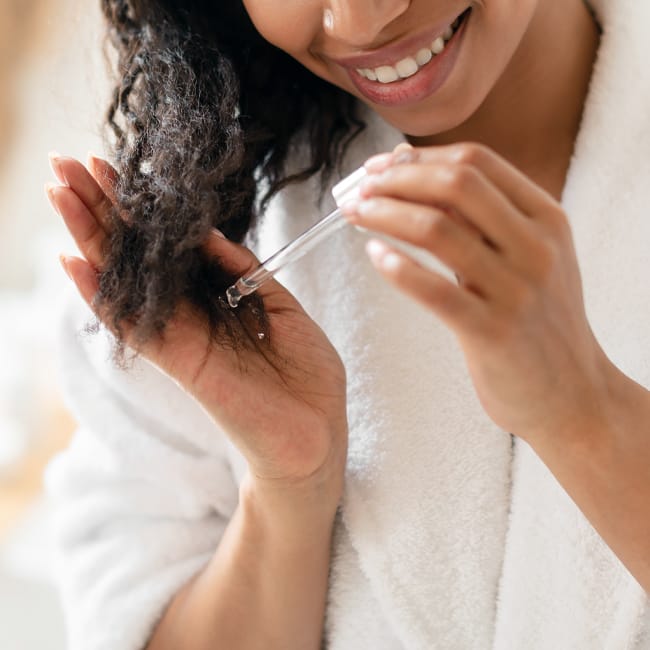If you’re hoping to grow thicker, shinier and stronger hair, your diet is just as crucial to accomplish this goal as the products you use daily. We checked in with doctors, experts and hair health aficionados to learn more about four nutritious foods that they suggest adding more of to your weekly menu to make your tresses as powerful and stunning as ever.
Read on for tips, suggestions and insight from Dr. Matt Angove, ND, holistic naturopathic doctor, hair expert and low-iron specialist and Dr. Enrizza P. Factor, MD, dermatologist and medical health writer at My Eczema Team.


4 Hair-Loving, Iron-Rich Foods:
1. Spinach
Iron, Angove explains, is "essential to the production of hemoglobin, which transports oxygen to the body’s red blood cells to help with resiliency and repair."
This, he says, includes the body’s cells associated with hair growth. "If someone is not consuming enough iron-rich foods or taking a supplement to meet daily requirements, gradual hair thinning may be one of the first signs that is noticed," he adds.

To avoid this, Angove recommends eating more iron-filled spinach, as it is also an excellent source of hair-loving vitamins A, C and K, as well as folate and potassium. Factor agrees, and notes that spinach is a "healthy green vegetable that’s loaded with beneficial nutrients that can promote hair growth."
Iron, she echoes, helps red blood cells "carry oxygen throughout the body to fuel your metabolism" and aid not only growth, but also repair for damaged tresses."

2. Beans (Kidney & Black)
While there are many different types of healthy beans out there, Angove suggests adding more kidney and black kinds to your diet for your hair health. "I have treated hundreds of patients with thinning hair and hair loss, and I always tell them to eat kidney and black beans," he says.
Iron deficiency, he warns, is "also responsible for telogen effluvium, which is hair loss caused by illness or intense physical activity." Eating more of these beans, he emphasizes, can lessen the risk of hair loss and premature thinning.

Addressing an iron deficiency often helps "reverse the problem" of hair loss and "restores hair growth and thicker hair," he adds. Factor also points out that beans are a "great plant-based source of protein," which is essential to hair growth. "On top of all these benefits, beans are highly versatile and inexpensive, which makes them an easy addition to the diet," she says.

3. Red Meat (Liver, in Moderation)
Another easy way to add more iron to your diet is to eat more red meat, like liver, Angove recommends. He stresses, however, to only eat it in moderation for successful hair growth and to also prevent heart disease that often coincides with a very meat-heavy diet. "I recommend red meat only 1-2 times per week due to the association with cardiovascular disease," Angove says, while also pinpointing this food as a great source of iron.

Factor adds that meat is a staple in "many people’s diets" because it is "rich in nutrients that may aid hair growth." Red meat, in particular, she agrees, is "rich in a type of iron that’s easy to absorb."
This mineral helps the red blood cells deliver oxygen to all cells in the body, including hair follicles. "Deficiencies in protein and iron have been linked to hair loss," she reiterates, and this is another food that can prevent that dreaded outcome.

4. Dark Chocolate
While all of the aforementioned foods are known to be healthy additions to nutrient-filled diets, one surprising treat that Angove recommends eating more of for thicker hair is dark chocolate. "Many patients also enjoy snacking on dark chocolate, as just a small, 3.5-ounce piece can provide up to 65 percent of your daily iron requirement," he points out.

This dessert or snack can also be paired with raisins or dried fruit for a tasty combination, he suggests, if you're trying to add more iron for your hair health. "I advise patients to snack on raisins or any dried fruits, as they are also great sources of iron," he concludes.
"Women should stick to a well-balanced diet that incorporates all the major food groups and aim to lose no more than 1-2 pounds a week to avoid hair loss." The more you know!


























